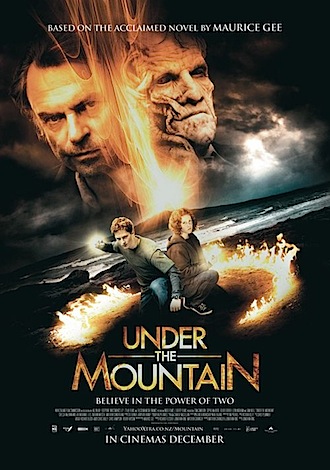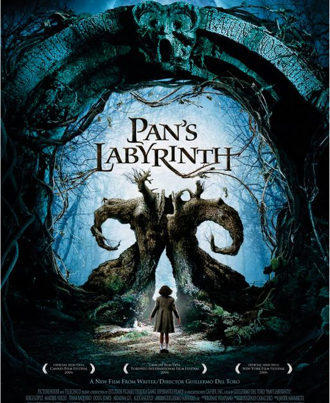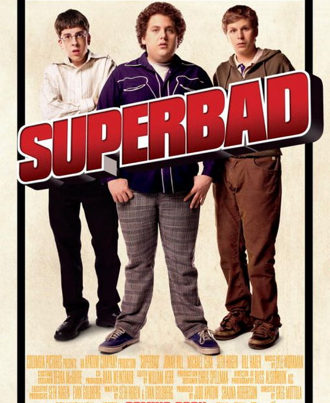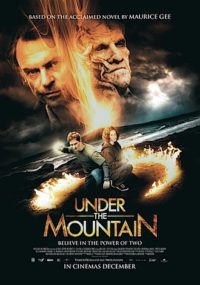 As the recent fuss over The Vintner’s Luck demonstrated, filmmakers adapting beloved New Zealand books open themselves up to all sorts of potential criticism, so when Jonathan King and Matthew Grainger announced that their next project was going to be a version of Maurice Gee’s Under the Mountain there were a great many excited people (mostly around my age it seemed) thrilled that their favourite childhood book was going to get the all-action big screen treatment.
As the recent fuss over The Vintner’s Luck demonstrated, filmmakers adapting beloved New Zealand books open themselves up to all sorts of potential criticism, so when Jonathan King and Matthew Grainger announced that their next project was going to be a version of Maurice Gee’s Under the Mountain there were a great many excited people (mostly around my age it seemed) thrilled that their favourite childhood book was going to get the all-action big screen treatment.
And yet, as a story pitched at older kids and young adults, it was going to have to be brought out of the original 70s context (and updated from its early 80s TV incarnation) or nobody would come. It’s a fine balance and for mine I think King and Grainger have done a good job – even if the restless crowd at Readings on Saturday afternoon might suggest otherwise.
Ginga twins Theo and Rachel (played by newcomers Tom Cameron and Sophie McBride are packed off to Auckland when Dad (Bruce Hopkins) can’t cope after Mum’s death in an accident. They share a psychic bond (although Theo resists) and it’s that bond – and their flaming red hair – that brings them to the attention of the creepy Wilberforces, neighbours on the other side of Lake Pupuke in the heart of the suburban North Shore.
It turns out that the Wilberforces are malevolent beings from another planet bent on destroying the world with the help of dormant monsters called Gargantua who are sleeping under Auckland’s dormant volcanoes. Only psychic red-headed twins, with the help of mysterious Sam Neill, have the power to stop them and there’s a race against time to prevent the end of the world.
There’s a lot to like about Under the Mountain. The kids are engaging (Tom Cameron flares his nostrils like a young Tom Cruise) and the make-up effects specifically are quite brilliantly done although the digital effects are slightly less successful. Oliver Driver is unrecognisable and very effective as the Wilberforce leader and the supporting cast do a good job of, you know, supporting.
A special mention should go to the city of Auckland which looks an absolute picture throughout the film, particularly via the beautiful aerial photography. It almost made me want to visit.
 Hilary Swank has already won two Oscars (Boys Don’t Cry, 1999 and Million Dollar Baby, 2004) but she’s giving herself another crack at the prize by Executive Producing Amelia, a biopic about the doomed aviatrix Amelia Earhart who beguiled America in the 1930s before disappearing over the Pacific on the final leg of her attempt to be the first person to fly around the world. It’s a role that many actresses have dreamt of and good on Swank for actually getting it off the ground.
Hilary Swank has already won two Oscars (Boys Don’t Cry, 1999 and Million Dollar Baby, 2004) but she’s giving herself another crack at the prize by Executive Producing Amelia, a biopic about the doomed aviatrix Amelia Earhart who beguiled America in the 1930s before disappearing over the Pacific on the final leg of her attempt to be the first person to fly around the world. It’s a role that many actresses have dreamt of and good on Swank for actually getting it off the ground.
As befits a star like her, she’s bathed in a beautiful golden glow throughout but the film itself rarely escapes the tired old clichés of the traditional Hollywood biography. Faked newsreels; spinning newspapers (even at one point a spinning newsreel which was very odd); characters having four sentence conversations which seem only to serve the purpose of telling each other (i.e. “us”) what they already know. You know the sort of thing.
Only when that final flight begins, and the scenes can really stretch out, does the film grow in to something more. The final 20 or 25 minutes is gripping and tense and, even though you know the outcome in advance, quite moving. Recommended but with reservations.
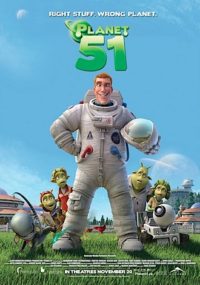 Absolutely not recommended in any circumstances, for any ages, is the animated “comedy” Planet 51 in which an astronaut with the voice of The Rock (I know, he’s not The Rock anymore) visits a strange far-off planet that just happens to look like America in the 50s – if America had been populated by lizard people who walk around with no trousers. They’re just like us, you see, and their alien invasion paranoia means that they chase the goofy interloper around the place until a bright young independent thinker called Lem (voiced by Justin Long) helps him out. Simply not funny.
Absolutely not recommended in any circumstances, for any ages, is the animated “comedy” Planet 51 in which an astronaut with the voice of The Rock (I know, he’s not The Rock anymore) visits a strange far-off planet that just happens to look like America in the 50s – if America had been populated by lizard people who walk around with no trousers. They’re just like us, you see, and their alien invasion paranoia means that they chase the goofy interloper around the place until a bright young independent thinker called Lem (voiced by Justin Long) helps him out. Simply not funny.
Finally, a brief word about audiences. Is it counter-intuitive to suggest that audience numbers for movies might be falling because of the behaviour of audiences? The Under the Mountain crowd on Saturday were the most restless audience I’ve ever experienced: running in and out of the theatre, texting (we can see the glow even if you try and hide it under your jacket), talking loudly. And then on Sunday night at Amelia two blokes behind me put their feet up on the back of the seat right by my head. And one of them didn’t even have shoes on which is just gross!
Audiences need to remember that buying an expensive movie ticket does not give them the right to behave in any way they want. It buys the right to enjoy a film with a community of other people, all sharing the same experience. If you behave that way at home, well, good for you. But you owe the rest of us a little bit of respect.
Printed in Wellington’s Capital Times on Wednesday 16 December, 2009.
This is another one of those pieces that got lost during a busy period. Posted here for completeness rather than usefulness (or entertainment value).

